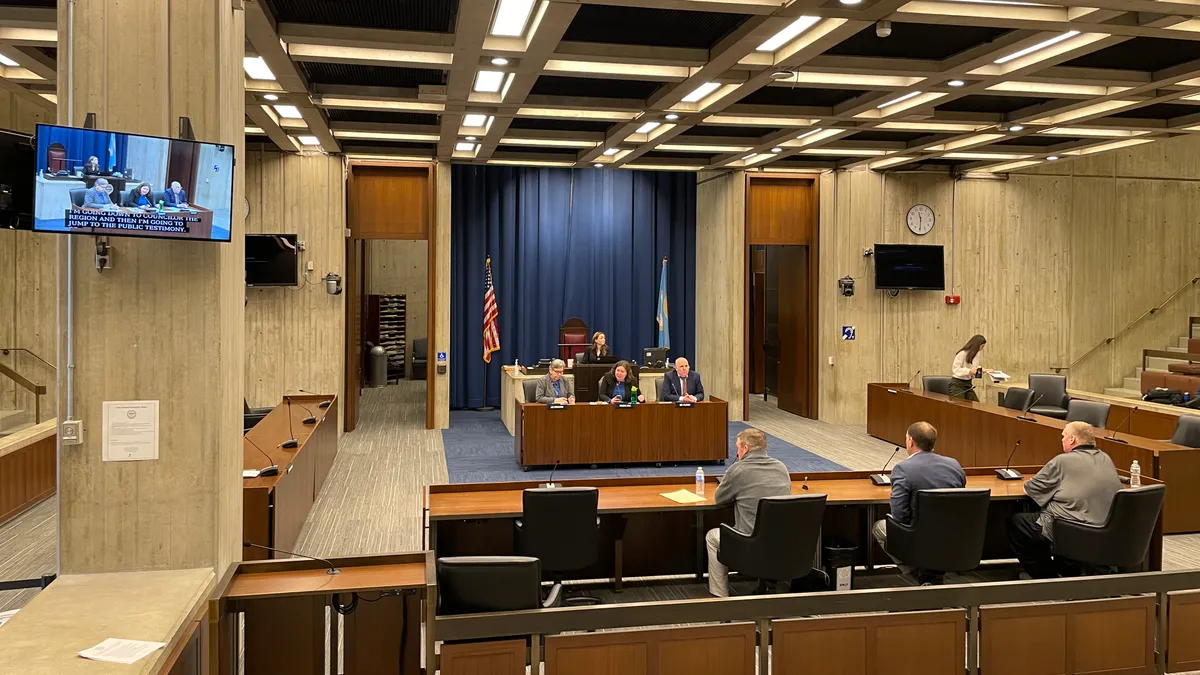Dive Brief:
- Boston aims to shake up its residential collection process — ahead of a Capitol Waste Services agreement expiring in June 2024 — with the potential to change service schedules and contract structures.
- Dennis Roache, superintendent of waste reduction for Boston’s Public Works Department, said during a Tuesday council hearing the city is “reconsidering everything” for the upcoming contract and hopes to move away from solely prioritizing the lowest price. "If we write better contracts, we can get better service, and that will be the ultimate goal,” he said.
- Bid documents are expected to be released by October or November, with the next contract starting on July 1, 2024. The agency is seeking to fill a fellowship position that would assist with research on contract best practices, and it has formed a task force to prepare for the bid process.
Dive Insight:
Boston established a zero waste plan in 2019 — which has led to growing programs for streams such as organics and textiles — but its core collection system for refuse and recyclables has seen few updates in recent years.
Tuesday’s hearing of the Committee on City Services and Innovation Technology focused on trash collection and rodent issues, the latter of which has reportedly gotten worse since the pandemic, according to officials and residents. Councilor Kenzie Bok, chair of the committee, was especially focused on ways to update policies that allow trash to be set out the night before collection shifts begin at 6 a.m. — especially in areas that don’t have carts.
"It's just offering the rats a buffet overnight,” said Bok. "The bags ... might as well not exist; it's like pouring out food on the sidewalk for 12 hours.”
Bok and others repeatedly cited a recent policy update in New York that delayed setout times and incentivized containerization as a potential model. Roache agreed that was a “huge step in the right direction in terms of helping rodent control.” Boston’s curbside organics collection program was also referenced as a way to help, though it will still only serve up to 20,000 households after a planned expansion this summer.
The city’s residential collection system covers single-family homes and smaller multifamily buildings, along with Boston Housing Authority properties and other local government buildings. Carts are not required for residences and are not used in multiple downtown neighborhoods due to limited storage and sidewalk space.
Roache said the city was looking for ways to pilot various containerization systems in addition to reconsidering setout times and the geographic makeup of collection districts. Current boundaries, which are a key consideration in the bidding process, haven’t been updated for many years, even as the city has seen ongoing development.
When Boston last put its collection contract out for bid, in 2019, it only received two proposals: one from Capitol and the other from Sunrise Scavenger. Roache said getting additional bids historically has been challenging due to Boston’s complex logistics and the contract’s emphasis on low pricing.
"The way that they're written now, very few contractors have wanted to come in and work inside Boston, for many reasons — tight streets, traffic," he said. "It's been tough attracting quality trash contractors to the city."
The Massachusetts waste market has seen significant consolidation through acquisitions in recent years, and it’s now largely dominated by large publicly traded or private-equity backed players that have been especially focused on higher pricing.
For this next bid process, Boston may split off separate contracts for yard waste or specific city agency buildings as a way to provide entry opportunities for minority- and women-owned haulers. Boston’s recent programs for organics, textiles and mattresses have also presented new contract opportunities in recent years.
At the same time, officials are cognizant of the potential for this growing number of service options to increase truck traffic. Some residents also complained about overnight noise from commercial collection trucks, which operate in an open market system for businesses and larger residential buildings.
State Rep. Jay Livingstone of Boston has introduced a bill that would allow more local control over collection hours. While Boston’s zero waste plan included a mention of potentially shifting to a zone system that would limit the number of haulers, and the concept was briefly discussed during the hearing, the idea doesn’t currently appear to have traction.
The hearing also highlighted the challenges of finding a holistic approach when multiple city agencies oversee certain aspects of Boston’s waste system. Council President Ed Flynn said he has been talking with cities around the country about waste and rodent issues, with plans to allocate further resources.
“We increased the budget to deal with this issue last year, I think we need another significant increase as well this year,” said Flynn.
Other key contracts are also set to expire next year — including a MRF processing deal with Casella Waste Systems and disposal contracts with Covanta and WIN Waste Innovations — but those are more likely to be extended as the emphasis remains on updating collection.
"We really don't want to miss the opportunity with the trash contract to get something as well-tailored to our needs as possible,” said Bok.















